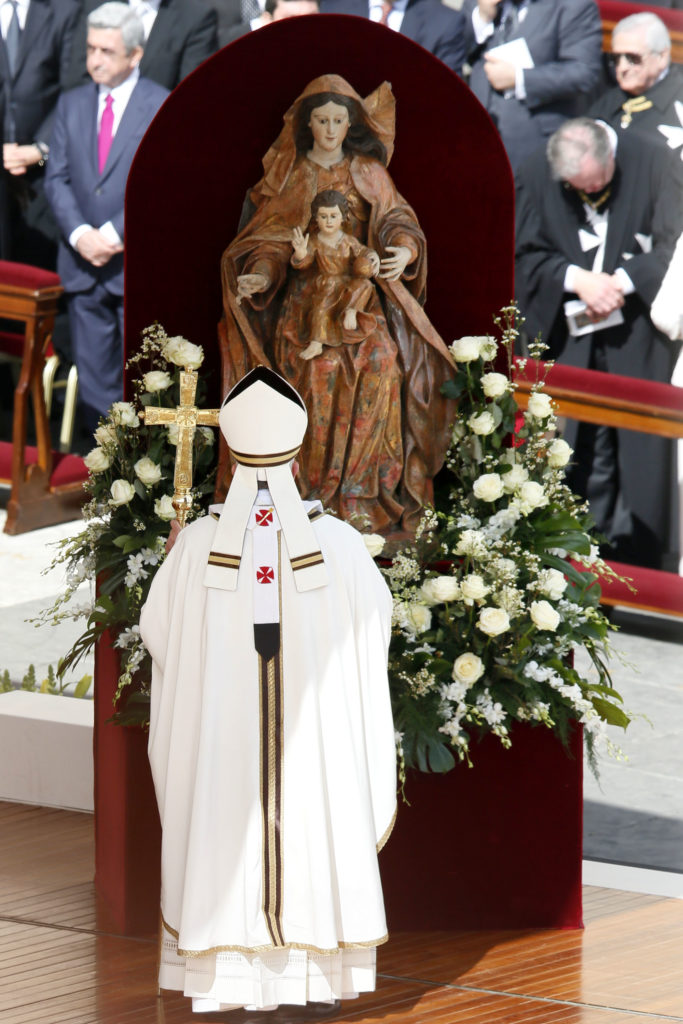Cana In Galilee
John 2:1-12
By Anne Lastman

As I re read and re-read the passage from John’s gospel a thought keeps coming to my mind. A thought which keeps gnawing away. Perhaps we are looking at the wrong person when it comes to obedience. Instead of focusing on Jesus’ obedience to his mother our attention should perhaps be on our Blessed Mother’s obedience to the will of the Father.
In the “Canticle of Mary” (Lk1:46-56) our Blessed Mother says her soul “Proclaims the greatness of the Lord”. Her life reflects the will of God not her own. But later, at the presentation Simeon tells Mary that she will be pierced, wounded. The trials she had already gone through from the announcement by the angel Gabriel through to the visitation, then the birth of her son, Jesus, and then Simeon’s prophecy all point to the reality that doing God’s will means sacrifice but Mary was always obedient to God’s will through all these trials.
Isn’t one of the greatest sufferings a loving mother endures is to give up her child? Yet, Mary, as we read in the passage of Luke and the “Finding of her son at the Temple”, realized that this was what she must do in obedience to the Father’s will. I doubt that she fully realized what this giving up entailed and the surrendering she would experience, yet she was always obedient to God’s will.
At the wedding feast she would experience in a very real way the fact that in obedience to the Father’s will the time had come when she herself would have to give up her son. Point him towards the beginning of his father’s work, and in a profound way even experience a loneliness because of the sending him on his way, a separation from her.
John uses the term “Woman” when Jesus addresses his mother. It’s at Cana that we first read Jesus calling his mother “woman” instead of “mother” and in the rest of John’s gospel “woman” is the only term Jesus uses when addressing/referring to her.
Some, from what I have read, hold that this is a rejection of the role of Mary as mother and therefore is a rebuke and a reason to reject Mary’s role in the Church. I think, however, this actually is a lesson from Jesus of Mary’s true role, namely, while her maternity is important what is more important is her obedience to God’s will in regards to his own mission of redemption and reunion of humanity with the creator God which had been missing since creation and sin in the garden and therefore a humanity devoid of true experience of joy.
I think this is brought out through several important symbols presented in the Cana narrative. First is the fact that they were at a wedding feast. Marriage, as intended by God, is not only the expression of the love of two people but from this love to produce children – the continuation of a human being and hence mankind’s future. Fulfilling the “be fruitful and multiply” command (Gen. 1:28, 9:7)
But this brings in the second important symbol: Wine. In the Old Testament, wine was always a symbol of joy and a new beginning (one example was Noah planting a vineyard after the flood). But here in Cana we find at a feast celebrating man’s future and the wine brought by man is running out – the joy of man, through his own efforts is running out, is empty.
John does not tell us how Mary came to know the wine was running out but she does know and brings this situation to her son. When I reflect on his answer it seems that he tells his mother what she already knew in her heart. He calls her “woman” (implying woman of Genesis) not mother, she would be the new “woman” of the new creation but to be this new “woman” she would have to give him up, to suffer, to watch him die, so that he would restore true joy to the world but not as the world expected.
We do find in Jesus’ words the real concern that we find in the other gospels, namely, that the world would misunderstand what he must do to bring this joy, because his “hour” had not yet come, but that she, the “woman” must set him forth towards that hour. She the “woman” would be enmeshed in “that hour.” Perhaps we could even say that she had to give permission for him to leave her and begin his work.
There is a “type” of this in Old Restatement where the father deeply pained gives permission to sacrifice his son (Abraham and Isaac) however we have no record of his mother Sarai giving permission for this to happen, that is, to set her son on his journey towards being sacrificed. The father Abraham gave permission but the mother did not.
In the instance of Jesus and his mother Mary, the Father has already given permission for his Beloved son to be the “lamb of God who takes away the sin of the world” (Jn.1:29-51) and in this instance the mother’s permission is also asked. As her permission was asked to conceive him and begin his journey to complete a work, that is “to save his people from their sins” (Mt1:21) so too is now asked her permission to set him off on is final journey.
And what happens next shows both Jesus’ obedience to Mary, but also Mary’s obedience to the Father. She tells the servants simply to do what ever he tells you. (Jn 2:5) Here, Mary is truly reflecting God’s will as does her son “not my will but your will be done” In this pericope and throughout the gospel is his belief that His Father’s will must be done as he promised and vocalised in Gethsemane.
And the result is, symbolically, as the servants do what Jesus tells them, that is when they do the will of the Father, there is unexpected joy beyond measure. There is wine/joy aplenty.
So there is no contradiction, Jesus and the “woman” are responding to the will of the
Father each in their own way.
The “woman” of Cana now reverses the error/sin/disobedience of the woman of Genesis. The “woman” of Cana does what is asked of her (Father’s will) which is the reversal of what the woman of Genesis did not but did another’s will. The woman of Cana says “Do whatever He tells you” The woman of Genesis was tricked into doing what another inveigled her to do and not the will of her creator.
In the marriage feast of Cana, we see at play elements of all the covenants which God made with His people in order to bring about and recreate His creation without having to destroy it. These covenant features are being brought in play in what appears to be a family celebration
Marriage (man & woman) Genesis, Man and woman,
Noah (vine/wine. Planting of vine and promise never to destroy humanity again. Rainbow covenant)
Family covenant (Abraham & tribe) and in NT the family of Jesus together and also a family feast.
Moses A nation- A People. Those called to be his people who will be redeemed.
David… Kingdom- An expansion of the chosen people
Jesus …Humanity – All will be saved. (The lamb of God who takes away the sin of the world).
The wedding feast at Cana (Qanah) rather than being just a wedding, important as that is, is a catechesis on God’s Will, love, sacrifice, promises made and kept.






